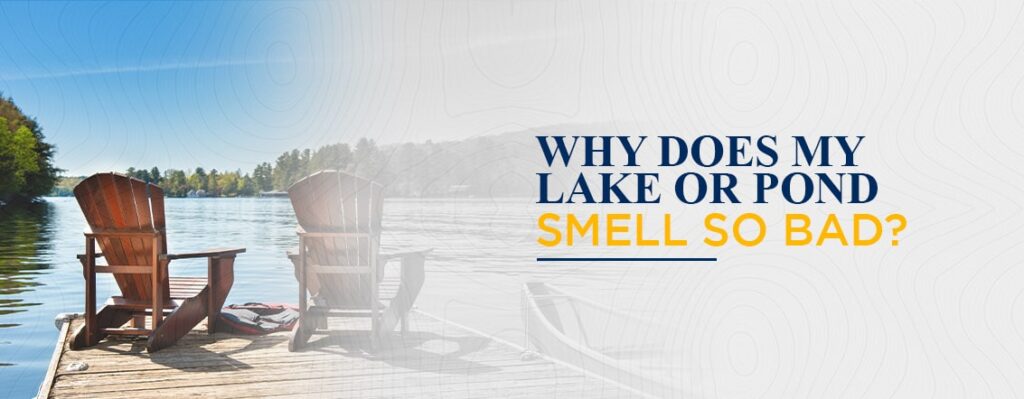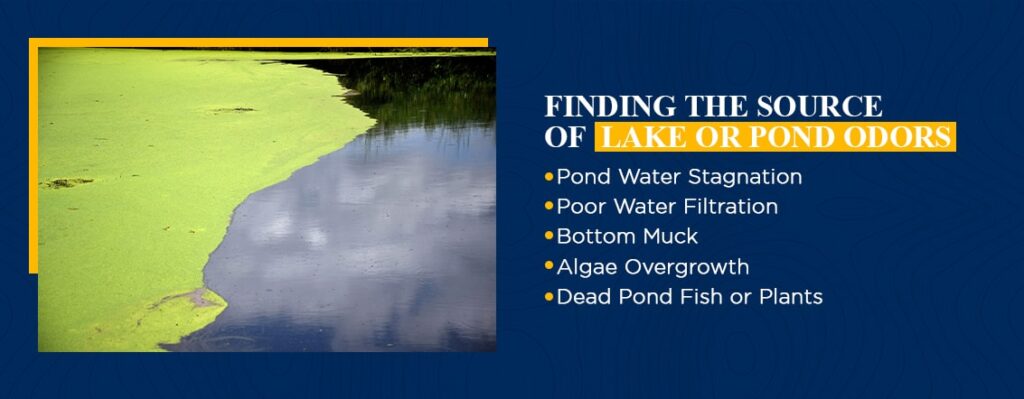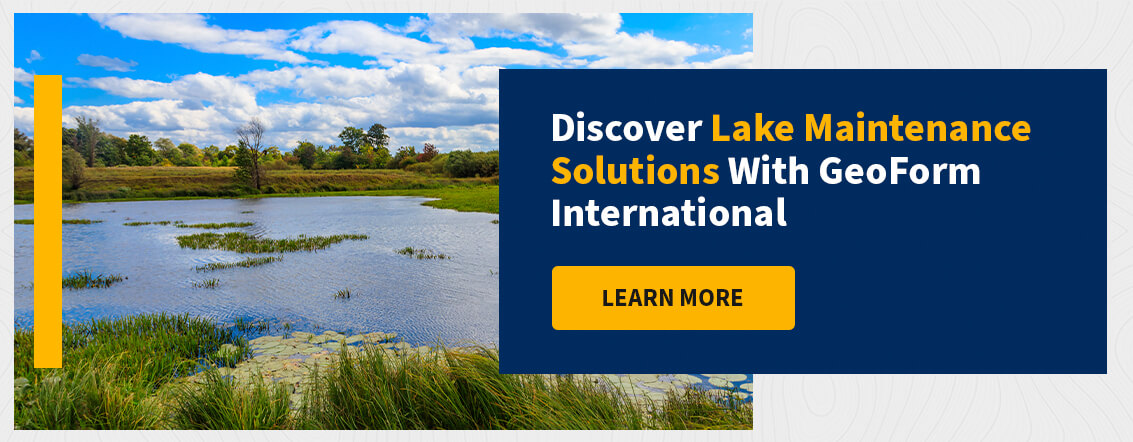
The lake or pond in your HOA, golf course or housing community provides aesthetic appeal and adds a peaceful atmosphere to your property. Your body of water might have an odor because of low oxygen, algae and fish decay. You can dredge your smelly lake or pond to protect your wildlife and provide a better experience for your guests. This guide can help you figure out why your pond or lake smells unpleasant.
Causes of Pond and Lake Odors
Properly maintaining your lake or pond should keep your water healthy and odor-free. Explore some of the reasons you might notice smells coming from the water.
1. Pond Water Stagnation
A lack of water movement will reduce its oxygen supply and promote algae and odorous bacteria growth. If the water is stagnant, you may start to smell rotten eggs, especially in the spring when the weather and temperature change.
When the oxygen supply is low, bacteria break down the waste at the bottom of the pond or lake. As a result of this decomposition process, the water develops carbon dioxide and hydrogen sulfide. Once the weather gets warmer in the spring, the warm air rises and produces an unpleasant smell.
2. Poor Water Filtration
Filtering your pond or lake water removes the organic and inorganic waste matter that makes your body of water smell. If you can’t put a filtration system in your natural body of water, you’ll have to use pond plants and algae to filter the water and remove sludge. On the other hand, if you have a pond or lake with fish, you’ll need to invest in a filtration system to make sure the oxygen level is efficient for their survival.
Without proper filtration for dealing with sludge and protecting the wildlife, the organic matter in your water could reach dangerous levels and produce harmful smells. Your filter should be the right size for your pond or lake, and you should maintain it throughout the year.
3. Bottom Muck
Over time, excess debris creates sludge that produces odorous substances. This material contains organic matter such as fish waste and debris from trees. A small amount of sludge is normal to have at the bottom of a pond or lake. It can even be a natural fertilizer that provides nutrients to your pond plants. Sludge could become a problem if the smell rises to the surface. Keep an eye out for thick, black sludge that could result in danger for your lake or pond.
4. Algae Overgrowth
Your pond may smell bad because of an abundance of pond algae. Since they’re living creatures, having too many algae in your pond could result in unpleasant odors when they die off. The sharp rise in algae decomposition can wear down on the pond’s ecosystem and reduce the oxygen supply that fish need to live. The natural filtration system that breaks down organic waste also needs oxygen. As a result, your fish could die, and your pond could produce a rotten-egg smell.
5. Dead Pond Fish or Plants
Harsh, cold weather could kill pond plants, which decay in the spring, reducing the oxygen levels in the water. Fish could also die in the winter if the water is frozen and there isn’t enough oxygen. Even when fish die from old age and other natural causes, you’ll need to remove them as soon as possible to limit the presence of ammonia and other harmful, odorous substances.
How To Get Rid of Pond or Lake Odors
A combination of dredging and aeration can help you manage the smells in your pond or lake. Follow these tips for preventing sludge buildup in the first place.
-
- Remove dead leaves from the water: Trees can deposit dead leaves into your lake or pond that sink to the bottom and turn into sludge. If you notice debris buildup, scoop it out before it becomes muck at the bottom of your water.
- Plant vegetation around your pond or lake: You can plant helpful greenery around your body of water to keep grass clippings, dirt and leaves from dropping into the water. Instead of waiting for built-up debris to become sludge, you can easily clean it up around the pond or lake’s edge.
- Control your fish population: An overpopulation of fish can lead to sludge as they compete for oxygen and die off. Try to limit your fish population so you can have a healthy balance of organic material in your lake or pond. It’s also helpful to avoid overfeeding fish, since leftover debris could add more sludge to your water.
- Use beneficial bacteria: Aerobic bacteria can treat existing sludge and prevent sludge buildup by removing organic matter from your water supply.
5 Signs You Need to Dredge Your Pond or Lake
You can remove the odors from your water by dredging your lake or pond. This process removes sediment and debris so the water can flow freely and smoothly. You’d know if you need to dredge your pond or lake in the following conditions.
- Your pond or lake smells bad: By taking out the bottom muck, sludge and decaying plants and animals, dredging can remove smelly substances and restore oxygen flow. You may also want to use an aerator with your dredging equipment for long-term odor management.
- You notice algae covering the water: Algae naturally occurs in a pond or lake, but an overabundance of them is unsafe for your water supply. Besides harming your fish, these creatures can make the pond unattractive and murky. You can dredge the water to control your algae population and keep your pond or lake healthy.
- You discover a decrease in surrounding wildlife: A healthy pond is a safe place for various wildlife, such as insects, frogs and birds. When you have too little oxygen or too many decayed materials in your lake or pond, you may notice less wildlife near your water. Consider whether you’ve had birds fly by and now no longer see them. Dredging the debris out of your water will attract animals back to your property.
- Your pond or lake isn’t attractive: A smelly body of water doesn’t look appealing. If you notice eroding waterlines, overgrown plants or a lack of water circulation, you’ll want to dredge your pond or lake. Dredging improves your water’s depth, width, clarity and plant life.
- Your pond or lake water isn’t flowing: Water should always be moving to control oxygen and prevent debris buildup. If your water looks stagnant, dredging it will help restore its natural flow.
The Effects of a Smelly Pond or Lake
A smelly pond or lake harms the wildlife in your water and the surrounding environment. Sludge, the organic matter at the bottom of your pond or lake, needs oxygen to decompose. When this substance uses oxygen from the pond or lake, it takes away the oxygen levels necessary for fish survival.
A smelly lake or pond can also reduce your quality of life. Sludge creates anaerobic bacteria, which produce hydrogen sulfide, a dangerous, odorous gas. The odors can be distracting as your guests walk around your golf course or residential facility. Unless you deal with these smells, you can offend your clients and reduce customer satisfaction.
Discover Lake Maintenance Solutions With GeoForm International
Dredging your lake or pond will improve the quality of your HOA, golf course or housing community. At GeoForm International, we offer several dredging products to help control the sludge in your water supply. For more information about our products and services, you can reach out to us online or call 913-782-1166.


